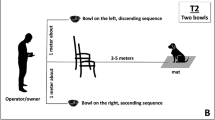Summary
In a shock-free procedure, goldfish were trained to acquire a preference for quinine or acetic acid for which they have an innate repulsion. Recipients of brain extracts taken from trained donors showed a positive reaction to the previously dislike taste quality. The change in reaction was observed between the second and the seventh day after injection. It was not exhibited by recipients of brain extracts prepared from untrained donors.
Similar content being viewed by others
References
Babich, F. R., Jacobson, A. L., Bubash, S.: Cross-species transfer of learning: effect of ribonucleic acid from hamsters on rat behavior. Proc. nat. Acad. Sci. (Wash.)54, 1299–1302 (1965).
Bieck, B., Zippel, H. P.: Schmeckschwellen und Dressur des geschmacklichen Differenzierungsvermögens beim Goldfisch. Pflügers Arch.307, 132 (1969).
Bieck, B., Zippel, H. P.: Differenzierungsleistungen in der geschmacklichen Dressur und Geschmackswirkungen von Riechstoffen nach Exstirpation des Bulbus olfactorius beim Goldfisch (Carassius auratus). (In preparation) (1971).
Byrne, W. L. (ed.): Molecular approaches to learning and memory. New York: Academic Press 1970.
Dyal, J. A.: Transfer of behavioral bias: reality and specifity. In: Chemical transfer of learned information (E. J. Fjerdingstad, ed.). Amsterdam: North Holland Publ. Comp. (in press).
Fjerdingstad, E. J., Nissen, Th., Røigaard-Petersen, H. H.: Effect of ribonucleic acid (RNA) extracted from the brain of trained animals on learning in rats. Scand. J. Psychol.6, 1–5 (1965).
McConnell, J. V.: Memory transfer through cannibalism in planarians. J. Neuropsychiat.3 (Suppl. 1), 42–48 (1962).
Reinis, S.: The formation of conditioned reflexes in rats after the parenteral administration of brain homogenate. Activ. nerv. sup. (Praha)7, 167–168 (1965).
Rosenblatt, F.: Induction of behavior by mammalian brain extracts. In: Molecular mechanisms in memory and learning (G. Ungar, ed.), pp. 103–147. New York: Plenum Press 1970.
Ungar, G., Fjerdingstad, E. J.: Chemical nature of the transfer factors; RNA or protein? Biology of memory (G. Adam, ed.). Budapest: Akademiai Kiado (in press) (1970).
Ungar, G., Ho, I. K., Galvan, L., Desiderio, D. M.: Isolation and identification of a specific behavior-inducing peptide extracted from brain. Proceedings Western Pharmacology Society (in press) (1970).
—, Oceguera-Navarro, C.: Transfer of habituation by material extracted from brain. Nature (Lond.)207, 301–302 (1965).
Zippel, H. P., Domagk, G. F.: Versuche zur chemischen Gedächtnisübertragung von farbdressierten Goldfischen auf undressierte Tiere. Experientia (Basel)25, 938–940 (1969).
Author information
Authors and Affiliations
Additional information
Supported by Deutsche Forschungsgemeinschaft (Sonderforschungsbereich 33).
Rights and permissions
About this article
Cite this article
Zippel, H.P., Domagk, G.F. Transfer of taste preference from trained goldfish (Carassius auratus) into untrained recipients. Pflugers Arch. 323, 258–264 (1971). https://doi.org/10.1007/BF00586388
Received:
Issue Date:
DOI: https://doi.org/10.1007/BF00586388




